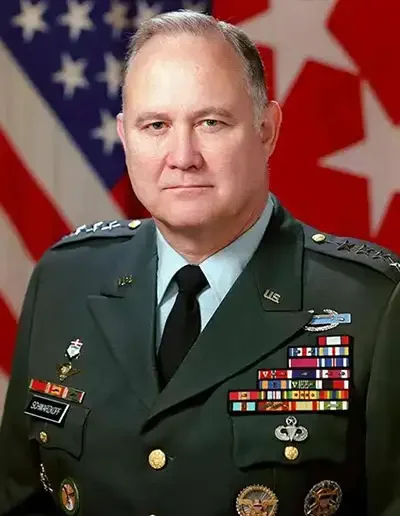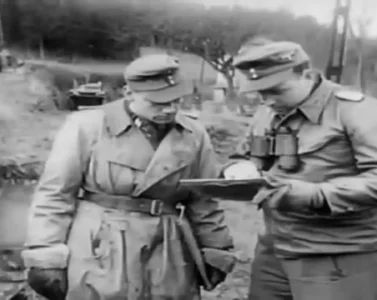- Military History
- Biographies
- Militarians Biographies
- General Norman Schwarzkopf Jr.
General Norman Schwarzkopf Jr.
An officer who commanded Operation Desert Storm, the American-led military action that liberated Kuwait from Iraqi occupation during the Persian Gulf War
Norman Schwarzkopf Jr. was born in Trenton, New Jersey and grew up in the US and later in Iran. His father was a brigadier general and had headed the investigation of the famous Lindbergh kidnapping case.
Schwarzkopf graduated 43rd out of his class of 480 at the US Military Academy at West Point and served for two years with the 101st Airborne Division. Schwarzkopf served in Berlin for two years before returning to West Point as an instructor.
The start of the Vietnam War, however, changed his plans; he went to serve as a task-force advisor to a South Vietnamese airborne division in 1965 and later served as a battalion commander.
Schwarzkopf served two tours of duty in Vietnam and was highly decorated during the war, being awarded three Silver Star Medals, two Purple Hearts, and the Legion of Merit. Surely one of his most famous actions was on May 28, 1970, when he chose to be landed in a minefield and lead a group of his men to safety. Because of his devotion to his men, as well as his high temper and self-assurance, many soldiers called him "Stormin' Norman”.
Rising through the ranks after the conflict, he later commanded the US 24th Infantry Division and was one commander of the Invasion of Grenada in 1983.
As commander-in-chief of the US Central Command, Schwarzkopf was the natural choice to lead the war against Iraq (1990-1991). After Iraqi dictator Saddam Hussein invaded and seized oil-rich Kuwait, Schwarzkopf was sent to Saudi Arabia to command Operation Desert Shield.
Welding together a coalition of allies from European, Middle Eastern, and North American countries, Schwarzkopf laid the groundwork for the invasion of Kuwait and the ejection of Iraqi troops. After a month of fierce aerial bombardment that failed to persuade Hussein to withdraw, Schwarzkopf was given the green light to unleash Operation Desert Storm.
The campaign lasted approximately 100 hours, from February 23 to February 27, 1991. Schwarzkopf's meticulous preparation paid off as his coalition forces outflanked, out-fought, and routed the Iraqi army. When a cease-fire was called on February 27, Schwarzkopf had liberated Kuwait and was in position to push all the way to Baghdad and remove Saddam Hussein from power.
But US President George Bush and head of the Joint Chiefs of Staff Colin Powell declared themselves satisfied that the United Nations' objectives had been attained. The war ended with Kuwait freed and Hussein corralled, but still in power in Iraq.
Schwarzkopf returned home after the Gulf War as a national hero. He was offered a promotion to Army Chief of Staff, but declined and retired from the military in August 1991, moving to Tampa, Florida.
Mentioned by some as a candidate for president in 1992, Schwarzkopf, considering himself an independent with little interest in running for a political office, dismissed such talk as rumors. Instead, he published his memoirs “It Doesn't Take a Hero” in 1992, which became a bestseller.
He received the Presidential Medal of Freedom and the Congressional Gold Medal in 2002, many other US military accolades and awards from foreign countries, including an honorary knighthood from Queen Elizabeth II of England.
While living a quite low-profile retirement, he supported several children's charities and national philanthropic causes. He was a spokesperson for prostate cancer awareness, which he himself fought successfully in 1993, the recovery of the grizzly bear from endangered species status, and served on the Nature Conservancy board of governors.
While at first Schwarzkopf supported the invasion of Iraq (Iraq War 2003–2011), he later was critical of the operation especially as it didn’t take the cultural complexity of the Iraq into account and because there were no reconstruction plans after the fall of Baghdad. He as well was critical of Donald Rumsfeld and his handling of Operation Iraqi Freedom because of sending US Army Reserve troops into a country without adequate preparations.
Norman Schwarzkopf Jr. died at age 78 on December 27, 2012. He was cremated and buried near his father at the West Point Cemetery.
General Norman Schwarzkopf Jr. - Quick Facts
- 24th Infantry Division (United States)
- I Corps (United States)
- United States Army
- United States Central Command
- Vietnam War (1955-1975)
- Gulf War (1990-1991)
- {{#owner}}
- {{#url}} {{#avatarSrc}}
{{name}} {{/url}} {{^url}} {{#avatar}} {{& avatar}} {{/avatar}} {{name}} {{/url}} - {{/owner}} {{#created}}
- {{created}} {{/created}}
























